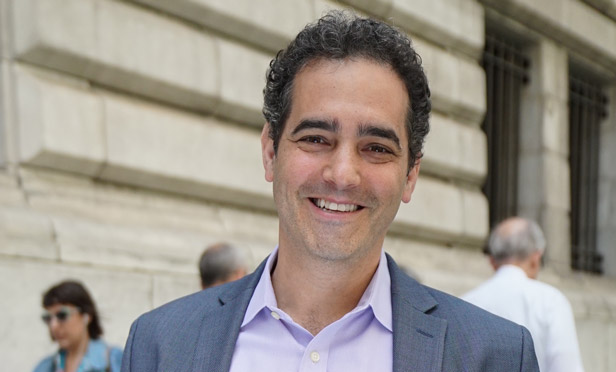 “When there's nopain of paying, we often don't know we're even making a financialdecision, and we certainly don't question it,” says financial'comedian' and behavioral finance expert Jeff Kreisler.
“When there's nopain of paying, we often don't know we're even making a financialdecision, and we certainly don't question it,” says financial'comedian' and behavioral finance expert Jeff Kreisler.
Put clients in the right frame of mind for retirement planningby connecting them emotionally to their future, older selves.
|Well, that's tough since most folks think of their future selvesas virtually separate people. So says behavioral economicsspecialist Jeff Kreisler in an interview with Katie Rass from oursister site, ThinkAdvisor.
|Still, the co-writer of famed Duke University professor DanAriely's most recent book provides actionable ways that advisorscan help workers become invested emotionally and financiallyin their future selves.
|Ariely is abehavioral economics expert and three-time New York Timesbestselling author (“Predictably Irrational”); founder of Duke's Center forAdvanced Hindsight lab; and chief behavioral economist of Qapital,an automated savings app.
|Kreisler, cool at givingserious finance a humorous spin, was Ariely's co-author for“Dollars and Sense: How We Misthink Money and How toSpend Smarter” (Harper, Nov. 2017). “If you want to get better atmaking good financial decisions,” read it, The Washington Postcheered.
|Kreisler is also the editor-in-chief of Peoplescience.com.
|To be sure, people are funny about money; that is, they're oftenirrational: “Money makes everyone do crazy things,” Ariely andKreislser state. Financial decisions are indeed one of life's hugechallenges, particularly because behavioral biases oftenself-sabotage the decision-making process, the authors say.
|In the interview, Kreisler discusses the No. 1 “financial sin”in a list of 10, which includes self-deception and greed.
|The former attorney and self-described “financial comedian” isoften hired to punch up executives' speeches to make themhumorously engaging. He has delivered talks to firms such as BNYMellon, Citibank and JPMorgan and appeared on CNN, Fox News andMSNBC. His first book, published in 2009, was the satirical“Get Rich Cheating” (Harper). Penthouse magazineproclaimed it “'Catcher in the Rye' for evildoers.”
|ThinkAdvisor recently interviewed Kreisler, on the phone fromhis New York City office. Among other issues, he examined the why'sof common money mistakes, as well as why a 401(k) plan is anirrational, but effective, retirement savings strategy.
|Here are excerpts:
|THINKADVISOR: Dan Ariely and you wrote: “Money makeseveryone do crazy things.” Why are people irrational about moneyand investing?
|JEFF KREISLSER: The irrationality comes fromuncertainty. When we're uncertain about things, we get emotionaland apprehensive and sometimes look frantically for a solution.Often we go for an easy answer. But that isn't always the mostrational or wisest.
|Yet you write that the person we trust most isourselves. But that isn't necessarily a good thing.
|Correct. We think that every decision we make is the right one.This can involve the behavioral bias called herding [following thecrowd]. Investors do it all the time: “Let's get onboard with thosehot stocks because everyone else is doing it.”
|Oftentimes, that “everyone else” becomes ourselves, orself-herding, based on decisions we ourselves have made in thepast. For example, if we spend $5 for coffee every day, eventuallywe convince ourselves that it's worth it — and then it just becomesautomatic.
|You cite a paper that Dr. Ariely and peers wrote showingthat men make poorer decisions while sexually aroused. Does thatapply to investment decisions too?
|I don't think they wired up people to an Ameritrade accountwhile they were aroused! But I would imagine that it would alsoapply. There are studies beyond Dan's showing that arousal doesaffect decision-making.
|In women, too?
|I don't know if they've tested women. My layperson's guess wouldbe yes, it applies to women too, but perhaps to a differentdegree.
|You specify “10 financial sins”: emotions, selfishness,impulse, lack of planning, short-term thinking, self-deception,outside pressure, self-justification, confusion and greed. Did yourank them?
|No. Because everyone is affected in their own way: different“sins” resonate with different people. But I think that ultimatelythe biggest one is lack of self-control, which is a result of ouremotions.
|Regarding retirement saving, you write that because wedon't know how we'll feel 20 or 30 years from now, people aredetached from their emotions about the future. And that could causethem to make bad investment decisions now.
|Absolutely. Even though investing feels that it should be anumbers-based game, there's so much emotion that goes intoinvestment decisions. Even with fund managers and personal wealthadvisors, often the decisions they make are driven by emotion,resulting, for example, in the bias of loss aversion — not wantingto take a big loss. That occurs with their own personal investingand sometimes for the people whose assets they're managing.
|How can advisors help clients feel connected to theirfuture selves when investing for retirement?
|One way is: Don't ask them, “What's your risk tolerance?” or“How much money do you want to have when you retire?” Instead, askthem to imagine life in retirement: “What do you want to do? Wheredo you want to be? Who do you want to be with?” Really get them tovisualize the details of their future lives, which will enable themto get a realistic picture of their needs and feel connected tothem.
|How will that help the advisors do a betterjob?
|They'll know what clients' needs are: must-haves andwould-like-to-haves. It will give advisors the tools toreverse-engineer how clients' investment portfolios should be.
|What are some other strategies to help connect employeesto their future retirement?
|Studies show that talking about a specific retirement date, say,Oct. 18, 2032, instead of saying, “14 years from now,” makesretirement planning less a “big notion” but more tangible andconcrete.
|What else can advisors do?
|This isn't a realistic tool for every advisor to use yet — but abank is experimenting with a UCLA professor to have people, wearingvirtual reality goggles, interact with computer-generated versionsof themselves in 30 years. In doing so, everybody decides to investmore money [than they otherwise would] for retirement savings.
|I like your zany suggestion that, to remind people ofold age and think long-term, companies should change theenvironment of their Human Resources departments — where importantretirement-savings decisions are made — to look like a doctor'soffice at a retirement home, with shuffleboard sticks and “No. 1Grandma” mugs.
|Yes, that would help people get in touch with their futureexistence.
|You state that a 401(k) plan is a “Ulysses contract”because it's irrational — yet it's very effective. Why isn't a401(k) rational?
|A Ulysses contract [binds you to the future]: You're, in effect,“tied to the mast of the boat,” can't [hear] “the Sirens” and sowon't be [doomed]. That is to say, with a 401(k), a barrier hasbeen created against future temptations. The savings are automatic,and you don't have the temptation to change the plan or take themoney out.
|But why is it not a rational strategy?
|It isn't in the sense that if you were a professional, you'danalyze your investment portfolio [on an ongoing basis] to maximizeit and probably do better than just putting [money] in a 401(k).The next best thing is to set it and forget it — this is aboutself-control. Ultimately, it's better to consistently save acertain amount for retirement and maybe not maximize growth versusnot saving any money at all.
|Based on a survey, 46% of financial planners don't havea financial plan for themselves, you write. Were you shocked todiscover that?
|I was surprised at first. I was just starting to dive into thismaterial and learn about irrationality in behavioral economics. Butin retrospect, I'm not surprised at all. Investing in our future isa real challenge because, again, we're not emotionally connected toour future selves. So we can intellectually tell ourselves weshould prepare, but emotionally we're not drawn to making thosedecisions.
|“The pain of paying” is another behavioral principlethat you and Dr. Ariely write about. Please explain.
|Paying stimulates the same region of the brain that physicalpain stimulates. Paying cash is the most painful, then comeswriting checks, using credit cards; and now there are veryconvenient [painless] paying [options], like Easy Pay and ApplePay.
|But aren't those new ways helpful?
|If you feel the pain of paying and thereby are conscious of thedecision you've made, you start questioning and thinking about“opportunity costs”: What else could this money be spent on now orin the future?
|That's very important. So though daunting, or even crippling,the rational thing is to step back and think about opportunitycosts. When there's no pain of paying, we often don't know we'reeven making a financial decision, and we certainly don't questionit.
|You write that with continuing advances in technology,things will be designed to make people spend more — ever moreeasily and too fast. Please elaborate.
|Many financial tools are designed to ease the burden offinancial transactions. The problem is, again, when something isthat easy, you don't realize you're spending money — no pain ofpaying. So it's not all great when those decisions are easier andless conscious.
|Are there any positives to painless paying?
|Yes, like easing the burden of savings and investing inretirement, buying insurance and putting money aside for healthcare — things that are hard for us to do but are wise for ourwell-being in the future.
Complete your profile to continue reading and get FREE access to BenefitsPRO, part of your ALM digital membership.
Your access to unlimited BenefitsPRO content isn’t changing.
Once you are an ALM digital member, you’ll receive:
- Critical BenefitsPRO information including cutting edge post-reform success strategies, access to educational webcasts and videos, resources from industry leaders, and informative Newsletters.
- Exclusive discounts on ALM, BenefitsPRO magazine and BenefitsPRO.com events
- Access to other award-winning ALM websites including ThinkAdvisor.com and Law.com
Already have an account? Sign In
© 2024 ALM Global, LLC, All Rights Reserved. Request academic re-use from www.copyright.com. All other uses, submit a request to [email protected]. For more information visit Asset & Logo Licensing.








